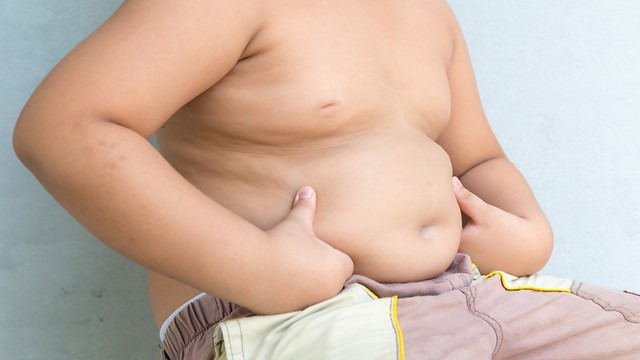The World Health Organization’s upcoming report on worldwide obesity has terrible data on Israel, which is only second to the USA for childhood obesity.
An upcoming report from the World Health Organization has shown that over half a million Israeli children are overweight. Compared to European countries, the group in which the Jewish state is categorized, Israel is in first place for overweight persons and in second place compared with Europe and third place globally when children are included.
The Commission on Ending Childhood Obesity’s report is to be released mid-October, but its interim findings were shared with medical professionals ahead of an international day fighting the obesity epidemic. This year, the day will focus on childhood obesity.
The report maps the state of children’s health in different countries and states that 28.8 percent of Israeli children under the age of 18 are overweight. The forecast for the future is worrying: The report states that within eight years, that datum is likely to jump 50 percent, and the number of obese and overweight children in the country is expected to reach 740,000, an unprecedented number by any measure.

Poor eating habits
Body mass index, which is figured from the weight and height of an individual with the formula of kg/m2, is what is used to categorize persons in different weight groups. A BMI of below 18.5 is underweight, and higher than 25 is overweight. A BMI of over 30 is obese.
Israel is in first place in the European group for obesity, with 12.6 percent of its children being considered obesity by this index. Globally, Israeli children are only behind their US counterparts, 12.9 percent of whom are obese. The European average is 7.4 percent for children. If children with BMIs of 25–30 are included, that figure increases to 23 percent of European children.
Healthcare professionals state that obesity is the most serious epidemic of recent years. “This is the biggest health problem in the Western world. It’s a ticking time bomb, with many health implications even in the present, and we aren’t doing enough,” warned Dr. Gal Dubnov-Raz, a senior doctor and manager of the Sport, Nutrition and Healthy Living Clinic at Sheba Medical Center.
“The simple reason for this is that children are taking in more calories than they are expending. According to WHO studies, children eat less healthily in most Western countries, they’re less active and they drink more sugary drinks.”
According to Dubnov-Raz, there is less awareness in Israel about physical exercise: “There are countries with daily sports classes, but in Israel, there are places that have a class just once per week. In addition, we don’t talk about proper and healthy nutrition, and even though the Ministry of Health makes efforts, it’s too little too late.”
More consequences to come
Senior doctors in the field of nutrition say that obesity has increased over the past three decades, and if drastic steps aren’t taken to stop the phenomenon, it will only get worse. The doctors pain a gloomy picture for the years to come: “We’ll see more and more obese children that will become fat adults who suffer from a lot of diseases. Soldiers will reach the army who aren’t in good enough shape, and we’ll have fewer athletes who will be able to represent us in the Olympics.”
According to studies in the field, excess weight and obesity in childhood directly influences children’s likelihood to become obese adults. An obese girl is 25 times more likely to become an overweight woman than a girl with a BMI between 18.5 and 25. An obese boy is 9 times more likely to become an obese man than his counterpart with a healthy weight.
“Most adults who today are obese weren’t obese children, so it proves that this is a phenomenon that can be stopped,” said Dubnov-Raz.
Overweight and obese children suffer from prolonged headaches, diabetes, high cholesterol, high blood pressure, joint and muscle pains, and breathing problems during sleep that are likely to reduce their alertness and concentration during class.

In addition to the health issues, there are social implications. Studies have proven that overweight and obese children suffer more insults and harassment regarding their physical appearance. “In many cases, these children have more depression and low moods, low body image, and they suffer from a lack of friends,” said Dubnov-Raz.
What to do
Whilst obesity is a serious problem, it has solutions. Dietitians recommend two critical measures that should go hand in hand: changing dietary habits and increasing physical activity.
“To prevent the epidemic, you need to change habits, teach kids to eat healthier and to exercise,” said Dubnov-Raz. “You don’t need to talk about or deal with weight; it doesn’t help, and it only hinders.” According to him, the way parents present a healthy lifestyle to their kids has a lot of importance.
For example, the term “diet” should be avoided, as it’s only likely to hurt. On diets, children lose a few kilos and usually gain them back. “If we teach kids to eat more fruit and vegetable and whole grains and prefer water to sugary drinks, it’s a lot more effective; otherwise, eating disorders are likely to develop.”
Another recommendation is to limit the advertisements of unhealthy fast food and the sale of junk food in schools, which both the Ministry of Health and the Ministry of Education have announced in recent months.
“The parents need to teach their children how to behave correctly and to choose the right food amidst the jungle of advertisements for harmful food,” concluded Dubnov-Raz. “Like a parent teaches their child how to act safely on a bicycle in the urban jungle—that’s how it needs to be with food. Otherwise, we’ll wake up in a few years, and we won’t understand how we got ourselves in this situation.”
As reported by Ynetnews
